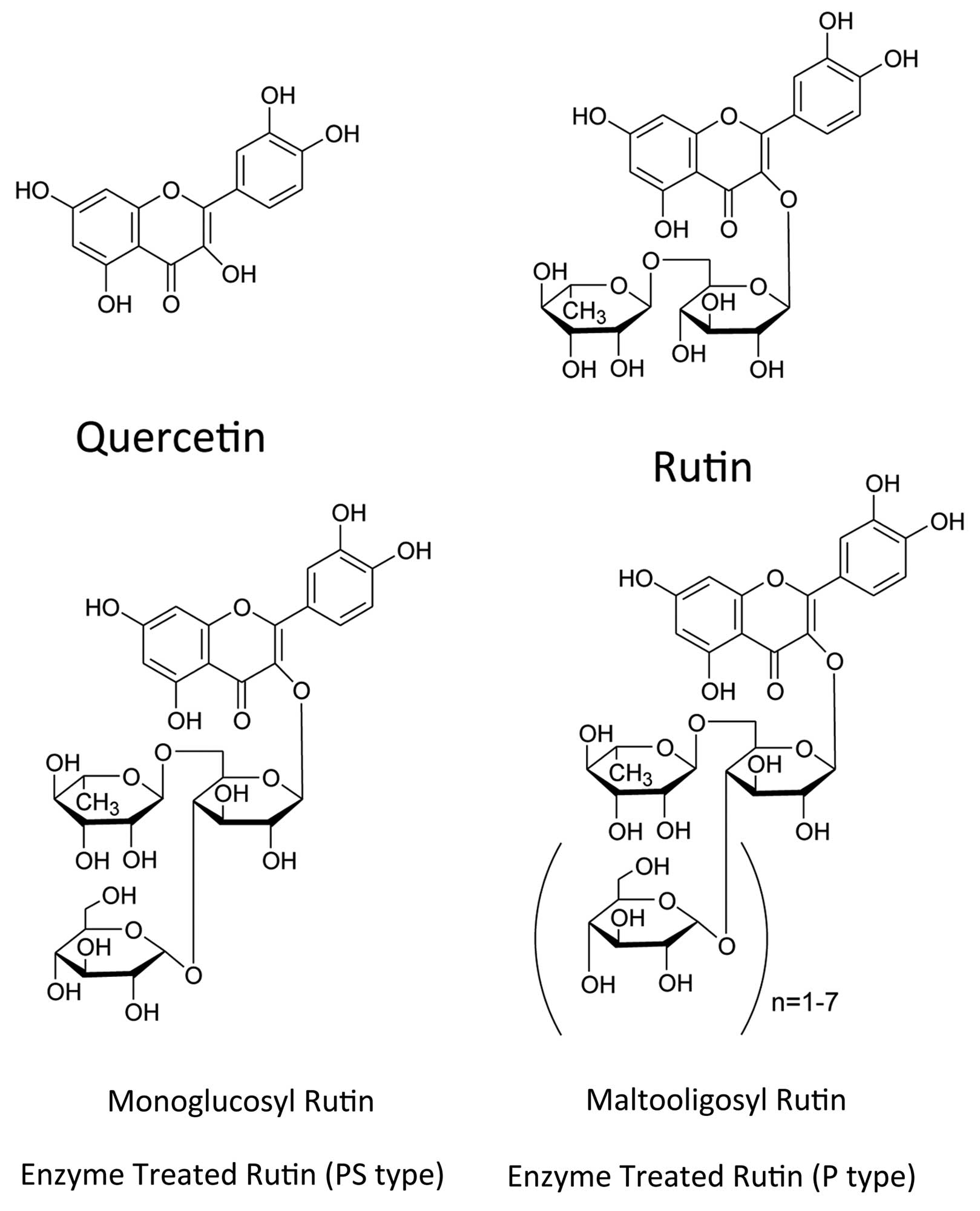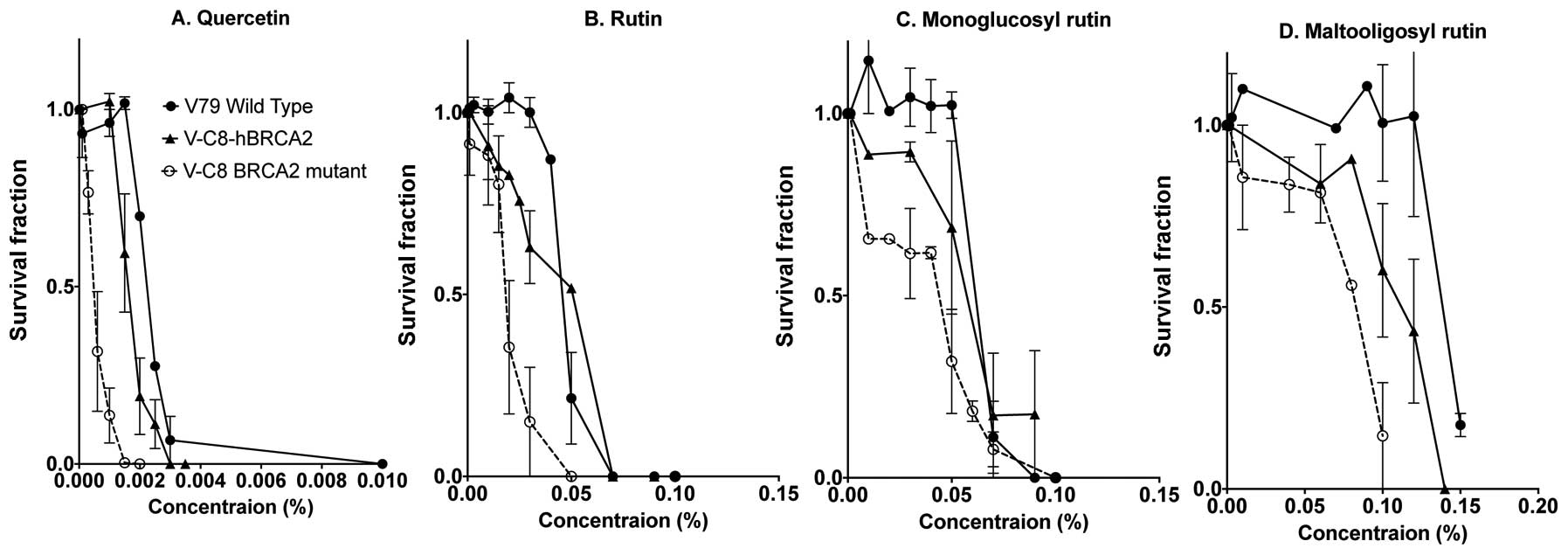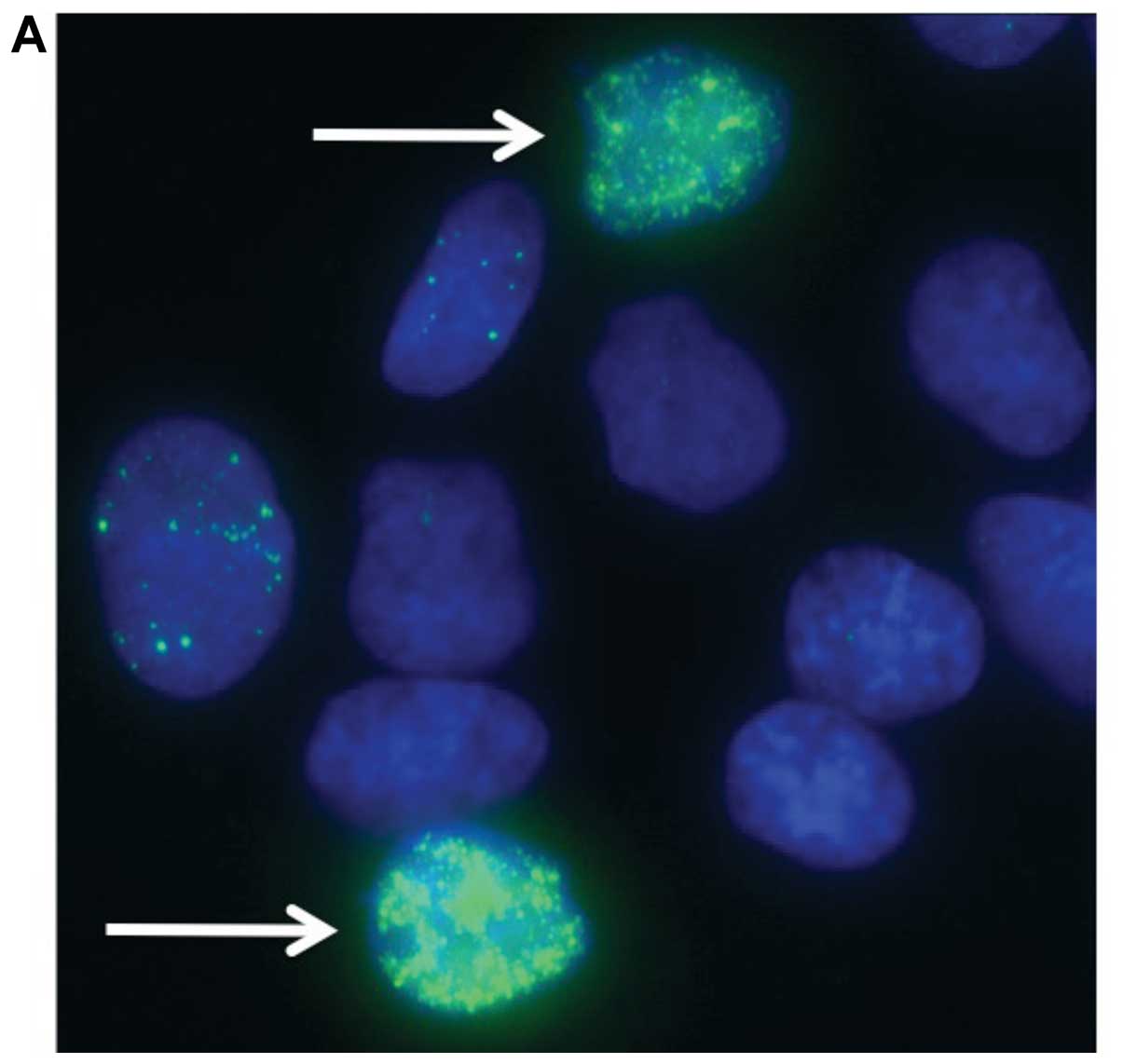|
1
|
Harwood M, Danielewska-Nikiel B,
Borzelleca JF, Flamm GW, Williams GM and Lines TC: A critical
review of the data related to the safety of quercetin and lack of
evidence of in vivo toxicity, including lack of
genotoxic/carcinogenic properties. Food Chem Toxicol. 45:2179–2205.
2007. View Article : Google Scholar : PubMed/NCBI
|
|
2
|
Day AJ and Williamson G: Biomarkers for
exposure to dietary flavonoids: a review of the current evidence
for identification of quercetin glycosides in plasma. Br J Nutr.
86(Suppl 1): S105–S110. 2001. View Article : Google Scholar : PubMed/NCBI
|
|
3
|
Boots AW, Haenen GR and Bast A: Health
effects of quercetin: from antioxidant to nutraceutical. Eur J
Pharmacol. 585:325–337. 2008. View Article : Google Scholar : PubMed/NCBI
|
|
4
|
Matsukawa N, Matsumoto M, Chiji H and Hara
H: Oligo-saccharide promotes bioavailability of a water-soluble
flavonoid glycoside, αG-rutin, in rats. J Agric Food Chem.
57:1498–1505. 2009.PubMed/NCBI
|
|
5
|
Chen YW, Chou HC, Lin ST, et al:
Cardioprotective effects of quercetin in cardiomyocyte under
ischemia/reperfusion injury. Evid Based Complement Alternat Med.
2013:3645192013.PubMed/NCBI
|
|
6
|
Bakhshaeshi M, Khaki A, Fathiazad F, Khaki
AA and Ghadamkheir E: Anti-oxidative role of quercetin derived from
Allium cepa on aldehyde oxidase (OX-LDL) and hepatocytes
apoptosis in streptozotocin-induced diabetic rat. Asian Pac J Trop
Biomed. 2:528–531. 2012.PubMed/NCBI
|
|
7
|
Lee KH and Yoo CG: Simultaneous
inactivation of GSK-3β suppresses quercetin-induced apoptosis by
inhibiting the JNK pathway. Am J Physiol Lung Cell Mol Physiol.
304:L782–L789. 2013.
|
|
8
|
Romano B, Pagano E, Montanaro V, Fortunato
AL, Milic N and Borrelli F: Novel insights into the pharmacology of
flavonoids. Phytother Res. July.4–2013.(Epub ahead of print).
|
|
9
|
Duraj J, Zazrivcova K, Bodo J, Sulikova M
and Sedlak J: Flavonoid quercetin, but not apigenin or luteolin,
induced apoptosis in human myeloid leukemia cells and their
resistant variants. Neoplasma. 52:273–279. 2005.PubMed/NCBI
|
|
10
|
Nijman SMB: Synthetic lethality: general
principles, utility and detection using genetic screens in human
cells. FEBS Lett. 585:1–6. 2011. View Article : Google Scholar : PubMed/NCBI
|
|
11
|
Bryant HE, Schultz N, Thomas HD, et al:
Specific killing of BRCA2-deficient tumours with inhibitors of
poly(ADP-ribose) polymerase. Nature. 434:913–917. 2005. View Article : Google Scholar : PubMed/NCBI
|
|
12
|
Basu B, Sandhu SK and de Bono JS: PARP
inhibitors: mechanism of action and their potential role in the
prevention and treatment of cancer. Drugs. 72:1579–1590. 2012.
View Article : Google Scholar : PubMed/NCBI
|
|
13
|
Poitras MF, Koh DW, Yu SW, et al: Spatial
and functional relationship between poly(ADP-ribose) polymerase-1
and poly(ADP-ribose) glycohydrolase in the brain. Neuroscience.
148:198–211. 2007. View Article : Google Scholar : PubMed/NCBI
|
|
14
|
Polyak K and Garber J: Targeting the
missing links for cancer therapy. Nat Med. 17:283–284. 2011.
View Article : Google Scholar : PubMed/NCBI
|
|
15
|
Dedes KJ, Wilkerson PM, Wetterskog D,
Weigelt B, Ashworth A and Reis-Filho JS: Synthetic lethality of
PARP inhibition in cancers lacking BRCA1 and BRCA2 mutations. Cell
Cycle. 10:1192–1199. 2011. View Article : Google Scholar : PubMed/NCBI
|
|
16
|
Peralta-Leal A, Rodriguez-Vargas JM,
Aguilar-Quesada R, et al: PARP inhibitors: new partners in the
therapy of cancer and inflammatory diseases. Free Radic Biol Med.
47:13–26. 2009. View Article : Google Scholar : PubMed/NCBI
|
|
17
|
Brandt A, Lorenzo Bermejo J, Sundquist J
and Hemminki K: Breast cancer risk in women who fulfill high-risk
criteria: at what age should surveillance start? Breast Cancer Res
Treat. 121:133–141. 2010. View Article : Google Scholar : PubMed/NCBI
|
|
18
|
Iqbal J, Ragone A, Lubinski J, et al: The
incidence of pancreatic cancer in BRCA1 and BRCA2 mutation
carriers. Br J Cancer. 107:2005–2009. 2012. View Article : Google Scholar : PubMed/NCBI
|
|
19
|
Christopoulou A and Spiliotis J: The role
of BRCA1 and BRCA2 in hereditary breast cancer. Gene Ther Mol Biol.
10A:95–99. 2006.
|
|
20
|
Whittemore AS, Gong G, John EM, et al:
Prevalence of BRCA1 mutation carriers among U.S. non-Hispanic
Whites. Cancer Epidemiol Biomarkers Prev. 13:2078–2083.
2004.PubMed/NCBI
|
|
21
|
Mavaddat N, Barrowdale D, Andrulis IL, et
al: Pathology of breast and ovarian cancers among BRCA1 and BRCA2
mutation carriers: results from the Consortium of Investigators of
Modifiers of BRCA1/2 (CIMBA). Cancer Epidemiol Biomarkers Prev.
21:134–147. 2012. View Article : Google Scholar
|
|
22
|
Teng LS, Zheng Y and Wang HH: BRCA1/2
associated hereditary breast cancer. J Zhejiang Univ Sci B.
9:85–89. 2008. View Article : Google Scholar : PubMed/NCBI
|
|
23
|
Verhaegh GW, Jongmans W, Morolli B, et al:
A novel type of X-ray-sensitive Chinese hamster cell mutant with
radioresistant DNA synthesis and hampered DNA double-strand break
repair. Mutat Res. 337:119–129. 1995. View Article : Google Scholar : PubMed/NCBI
|
|
24
|
Geraets L, Moonen HJ, Brauers K, Wouters
EF, Bast A and Hageman GJ: Dietary flavones and flavonoles are
inhibitors of poly(ADP-ribose)polymerase-1 in pulmonary epithelial
cells. J Nutr. 137:2190–2195. 2007.PubMed/NCBI
|
|
25
|
Kanai Y, Tanuma S and Sugimura T:
Immunofluorescent staining of poly(ADP-ribose) in situ in HeLa cell
chromosomes in the M phase. Proc Natl Acad Sci USA. 78:2801–2804.
1981. View Article : Google Scholar : PubMed/NCBI
|
|
26
|
Kuo LJ and Yang LX: γ-H2AX - a novel
biomarker for DNA double-strand breaks. In Vivo. 22:305–309.
2008.
|
|
27
|
Matsuo M, Sasaki N, Saga K and Kaneko T:
Cytotoxicity of flavonoids toward cultured normal human cells. Biol
Pharm Bull. 28:253–259. 2005. View Article : Google Scholar : PubMed/NCBI
|
|
28
|
Boege F, Straub T, Kehr A, et al: Selected
novel flavones inhibit the DNA binding or the DNA religation step
of eukaryotic topoisomerase I. J Biol Chem. 271:2262–2270. 1996.
View Article : Google Scholar : PubMed/NCBI
|
|
29
|
Spencer JP, Abd-el-Mohsen MM and
Rice-Evans C: Cellular uptake and metabolism of flavonoids and
their metabolites: implications for their bioactivity. Arch Biochem
Biophys. 423:148–161. 2004. View Article : Google Scholar : PubMed/NCBI
|
|
30
|
Ishikawa M, Oikawa T, Hosokawa M, Hamada
J, Morikawa K and Kobayashi H: Enhancing effect of quercetin on
3-methylcholanthrene carcinogenesis in C57Bl/6 mice. Neoplasma.
32:435–441. 1985.PubMed/NCBI
|
|
31
|
Venskutonis PR, Dedonyte V, Lazutka J, et
al: A preliminary assessment of singlet oxygen scavenging,
cytotoxic and genotoxic properties of Geranium macrorrhizum
extracts. Acta Biochim Pol. 57:157–163. 2010.PubMed/NCBI
|
|
32
|
Nakayama T, Yamada M, Osawa T and
Kawakishi S: Suppression of active oxygen-induced cytotoxicity by
flavonoids. Biochem Pharmacol. 45:265–267. 1993. View Article : Google Scholar : PubMed/NCBI
|
|
33
|
Tutt A, Robson M, Garber JE, et al: Oral
poly(ADP-ribose) polymerase inhibitor olaparib in patients with
BRCA1 or BRCA2 mutations and advanced breast cancer: a
proof-of-concept trial. Lancet. 376:235–244. 2010. View Article : Google Scholar
|


















